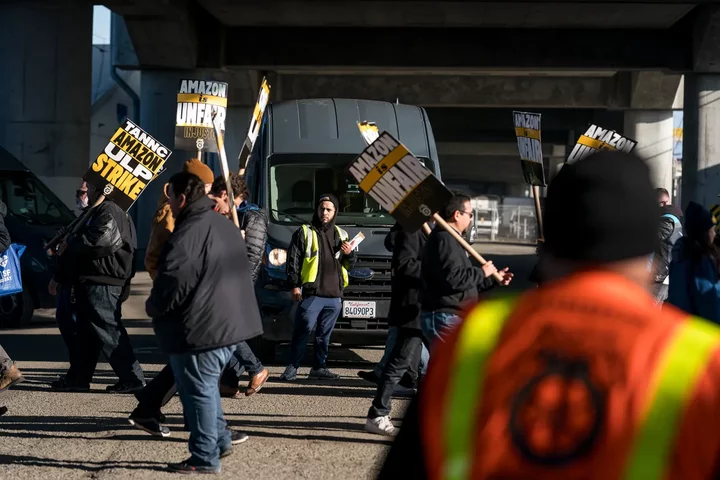A union worker blocks an Amazon delivery truck from leaving the warehouse at Amazon Warehouse DCK6 in the Bayview District in San Francisco on Dec. 19, 2024. Amazon workers at multiple facilities across the United States went on strike to fight for a union contract. Photo by Jungho Kim for CalMatters
California businesses are suing to halt a new state law that bars them from requiring employees to attend anti-union meetings at work.
The state’s Chamber of Commerce and California Restaurant Association filed the suit in federal court on New Year’s Eve, a day before the new law was to go into effect, seeking to block it from being enforced.
The law prohibits employers from disciplining workers who refuse to attend workplace meetings to hear about their bosses’ “opinion about religious or political matters” — including whether or not employees should unionize. Businesses could be fined $500 a day for violations.
Labor groups said these so-called captive audience meetings intimidate workers out of exercising their right to unionize; business groups argued it interferes with employers’ right to free speech, including discussing how political or policy developments affect their workplaces.
The law, authored by Hayward Democratic Sen. Aisha Wahab, was one of organized labor’s few victories in the 2024 legislative session. California joined about 10 other mostly Democratic states in enacting similar laws amid a surge of labor organizing in recent years. Expecting the Trump administration to be less favorable to them, unions have been counting on the state law to help preserve the more organizing-friendly environment of the past four years.
For example: the National Labor Relations Board, which has for decades generally allowed employers to hold so-called captive audience meetings, in November issued a ruling calling them illegal. But Amazon, the employer in that case, is contesting the ruling and labor experts expect the board to reverse its position under Trump. In that case, the California ban on the meetings would still apply.
But the suit challenging the law is no surprise. Businesses have already sued over similar laws in other states. Wisconsin in 2009 was one of the first states to ban such meetings; when employers filed suit the following year, arguing it conflicted with federal law, the state backed down and agreed not to enforce it. In Oregon, however, a court dismissed a similar challenge brought by the last Trump administration.
The California business groups, in their lawsuit, said the law violates the First Amendment and conflicts with the federal National Labor Relations Act. It prevents employers, they said, from “sharing true facts” with workers including the cost of union dues, “unions’ interference with employer-employee relationships, unions’ prioritization of the collective over the individual employees, and the financial impacts on employers.”
“Employers have the right to express their views and opinions on many issues,” said Jot Condie, president and CEO of the state Restaurant Association, in a statement.
Wahab could not immediately be reached for comment.
###
CalMatters.org is a nonprofit, nonpartisan media venture explaining California policies and politics.

CLICK TO MANAGE